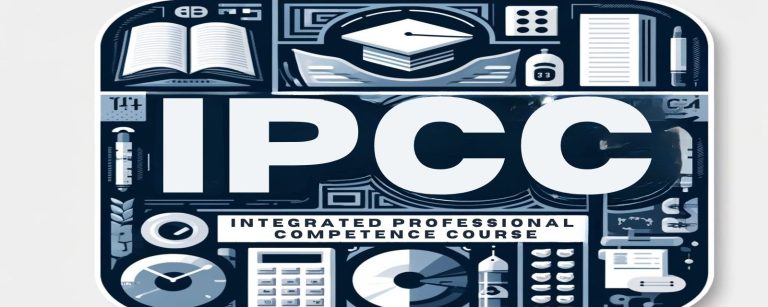If you are planning to enter the Chartered Accountancy (CA) field, then by now you must have heard the term IPCC full form in CA. The full form of IPCC is an Integrated Professional Competence Course. It was one of the major stages of the CA program. Although it has been replaced by CA Intermediate in the new scheme of study, yet among the commerce students and professionals, still, this term is very often used and discussed. This article provides detailed insights into the IPCC, including eligibility criteria, syllabus, exam pattern, and fees. With dedication and hard work, clearing the IPCC-or CA Intermediate brings students a step closer to their dream of becoming a CA.
IPCC Full Form in CA
The full form of IPCC is Integrated Professional Competence Course. IPCC is the second or second-level course of the CA (Chartered Accountancy) degree. Its curriculum is carried out by the ICAI(Institute of Chartered Accountants of India). Upon the satisfactory completion of this Integrated Professional Competence Course, an applicant is eligible for the final level in chartered accountancy.
IPCC covered the core areas like Accounting, Taxation, Business Law, and Auditing. Though replaced by CA Intermediate, most still call it an IPCC, mainly because those students who have pursued it from the earlier syllabus refer to it as an IPCC.
Eligibility Criteria for IPCC
A student must pass the CA CPT (Chartered Accountancy Common Proficiency Test) before appearing for the IPCC examination. A test is given following the conclusion of the course. The examination in question is called the IPCE (Integrated Professional Competence Examination). Both academic exams and practical training are included.
In this course, there are seven papers in total, separated into two groups. The first group has four subjects, while the second group only has three. All of these topics pertain to the knowledge system embedded in the field of Accountancy.
IPCC Syllabus
The IPCC syllabus was divided into two groups with seven subjects in total. This bifurcation of the syllabus allowed students to appear for all the exams group-wise or all at once. Let’s have a look at the syllabus in detail:
| Group | Subjects | Description |
| Group 1 | Accounting | Focuses on the principles of accounting, preparation of financial statements, and advanced topics such as partnership accounts and company accounts. |
| Business Laws, Ethics, and Communication | Covers key laws like the Indian Contract Act, Companies Act, and ethical practices in the corporate world. | |
| Cost Accounting and Financial Management | Introduces cost concepts, budgeting, and financial decision-making. | |
| Taxation | Includes Direct Tax laws and Indirect Taxes like GST. | |
| Group 2 | Advanced Accounting | Builds on the foundational accounting knowledge and includes topics such as accounting for amalgamations and consolidated financial statements. |
| Auditing and Assurance | Covers auditing concepts, standards on auditing, and professional ethics. | |
| Information Technology and Strategic Management (ITSM) | Focuses on IT systems, enterprise resource planning, and strategies for effective management. |
IPCC Examination Details
Each paper was worth 100 marks and had a duration of 3 hours. The examinations tested the understanding of accounting, taxation, auditing, and other disciplines. These examinations were very critical for those hoping to build their careers in finance and accounting.
The IPCE curriculum includes theoretical & practical learning. In this course, an applicant has seven papers that are divided into two categories. The first category is composed of 4 subjects
All these subjects of the first and second categories are relevant to the accountancy profession. A total of 200 scores in group 1 and 150 scores in group 2 are required to clear a class.
| IPCC Group 1 | ||
| Paper | Parts | Subject-wise Weightage |
| Paper 1 – Accounting | – | 100 |
| Paper 2 – Business Ethics, Laws and Communication | Part 1 – Law | 60 |
| Part 2 – Business Ethics | 20 | |
| Part 3 – Business Communications | 20 | |
| Paper 3 – Cost Accounting and Financial Management | Part 1 – Cost Accounting | 50 |
| Part 2 – Financial Management | 50 | |
| Paper 4 – Taxation | Part 1 – Income Tax | 50 |
| Part 2 – Service Tax and VAT | 25+25 | |
| IPCC Group 2 | ||
| Paper 5 – Advanced Accounting | – | 100 |
| Paper 6 – Auditing and Assurance | – | 100 |
| Paper 7 – Information Technology and Strategic Management | Section A – Information Technology | 50 |
Section B – Strategic Management | 50 | |
IPCC Fees
The fee structure of the IPCC course covers all the costs involved in registration, training, and exams. The course is so designed that it caters to students who wish to register for both groups or for one group. The fees for Indian nationals are broken down in detail as follows:
| Details | Both Groups (Rs.) | Single Group (Rs.) |
| Registration Fee | 15,000 | 11,000 |
| Student’s Activity Fee | 2,000 | 2,000 |
| Registration Fee as Article Assistant | 1,000 | – |
| Total Fees | 18,000 | 13,000 |
IPCC FAQs
1. What is the IPCC full form in CA?
Integrated Professional Competence Course, IPCC is the second level of CA program under older curriculum.
2. Can one register for IPCC after passing graduation?
Graduates with 55% or more in Commerce and 60% or above in other streams could directly register for IPCC through Direct Entry Route
3. Number of subjects present in IPCC syllabus?
There are seven subjects of IPCC, and they are divided into two groups. Four are under Group 1, while three are in Group 2.
4. Is IPCC passing criteria?
Candidate must obtain 40% minimum marks in individual subject and a minimum aggregate of 50% in the group.
5. What are the fees to be paid by the candidate at the time of IPCC course?
The total fees, including registration, exams, and mandatory training, were between ₹25,000 and ₹30,000 for both groups.


